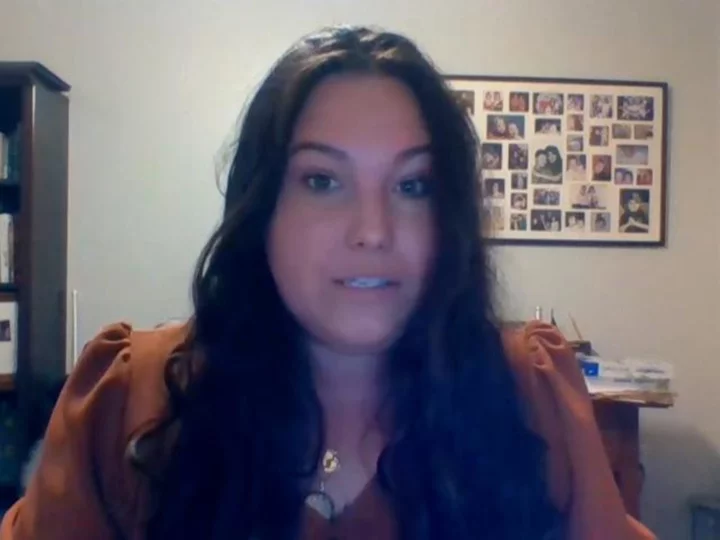
'I had no idea:' Florida teacher under investigation for showing Disney movie with gay character says she didn't know LGBTQ restriction applied to her class
A Florida teacher under a state investigation for showing a Disney movie featuring a gay character said she wasn't aware the state's controversial law banning instruction about certain LGBTQ topics had been recently expanded to apply to her grade level.
2023-05-16 15:27

McFly call Lewis Capaldi the new Bon Jovi
McFly singer Danny Jones has described Lewis Capaldi as the new Bon Jovi.
2023-05-16 15:23
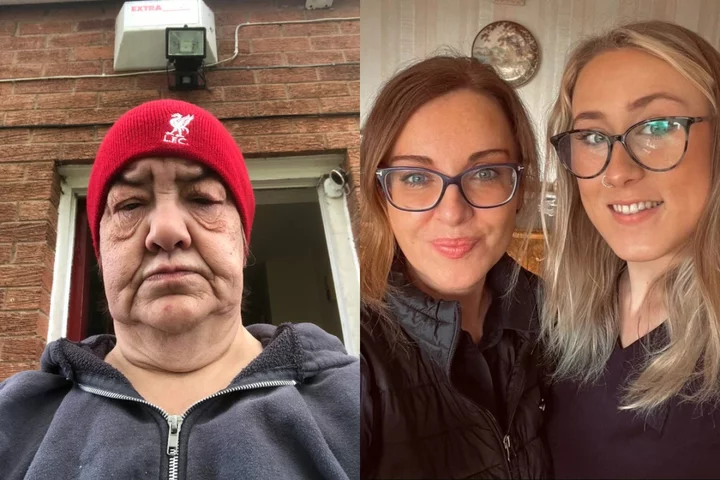
Woman says Specsavers saved her life with routine eye test
A woman who was left “severely epileptic” following multiple brain surgeries and whose seizures often leave her “black and blue” has said “Specsavers saved (her) life” as she had four unexpected and “frightening” convulsions during a routine eye examination and they were able to deliver first aid in her home. Jackie Rice, 56, who lives with her partner of 13 years Louise Cartwright, 55, who is paralysed and uses a wheelchair, was diagnosed with epilepsy about three years ago. As a result of her condition, Jackie, who lives in Harrogate, North Yorkshire, said she takes up to 20 pills every day and does not leave her home as she is “too frightened” that she will have a seizure. She cannot cook as she may burn herself or “set fire to (her) place” if she has a seizure; she has lost her driving licence, and she often sustains severe bruising from “smashing (her) face and head” during convulsions. Her seizures often cause her to wet herself as well, which she said is “embarrassing”. Because she is afraid to leave the house, she is reliant on the support of remote services, such as the Specsavers home eye tests, and is visited by a carer once a week . It was during a recent sight test visit that she had several epileptic seizures and started “banging her head against the wall”. Although she has no memory of it now, she believes she “would have been dead” if the Specsavers team had not visited her home that day. “They saved my life,” Jackie said. “My partner was in a different room, waiting for a carer, so she couldn’t help – it was awful. “I would have been dead – there are no two ways about it because there was nothing Louise could have done.” Nearly three years ago, Jackie said, Louise found her “unconscious in bed” as she had “collapsed”. After being taken to hospital, it was discovered Jackie had a hearing infection and three abscesses on the brain, which she believes were left undetected for a while. Jackie, who does not have any children and no longer works, remained unconscious and underwent three brain surgeries before waking up at Leeds General Infirmary (LGI) three weeks later. She said the procedures have left her deaf in her left ear and severely epileptic, and she now has about one seizure per week. “Four weeks after I had to put my dog to sleep, that’s when Louise found me,” Jackie said. “When I came around, I didn’t know where I was, I didn’t know who I was, or anything. “Because of the operations on my brain, it sent me delirious.” Jackie said she was told she tried to climb out of a hospital window during the recovery period, and she was not discharged until three months later. As a result of her epilepsy diagnosis, Jackie said she now takes up to 20 pills every day, and only leaves the house, accompanied by a carer, for necessary appointments or check-ups. Jackie said she does not know what triggers her seizures, but they often leave her “black and blue”. “The seizures come out of nowhere,” Jackie said. “I’m just recovering from a seizure at the moment – I have black eyes, a busted head and a banged-up face. “I’m black and blue again.” She said she spends her days with Louise, playing Candy Crush on her phone and watching sport on TV – she is a huge Liverpool Football Club fan. She is reliant on remote services to help her look after her health and wellbeing, but she never anticipated that she would have multiple seizures during a recent eye examination at home with Specsavers. All she can remember is starting the eye test and then “coming round in hospital three days later”, which she said was “very scary”. “It really does scare you when you wake up,” Jackie said. “I just thought, oh, where’s Louise? What’s happening? “You have no recollection of where you are.” Domiciliary optometrist Paula Conway, 52, who works for Specsavers based in York, covering the North Yorkshire area, remembers the day vividly. She and her optical assistant Charlotte Wilson visited Jackie’s home on January 13 for the routine eye examination. Just days earlier, on January 9, Paula explained that they had undergone first aid training from instructor Karl Whittaker at St John Ambulance. Little did Paula know that this training would be invaluable when visiting Jackie, as Karl talked in depth about what to do in the event that someone has a seizure. “I was about to proceed with the sight test and, all of a sudden, she just started rocking backwards and forwards, and I just thought, oh, this looks like a seizure,” Paula said. “She started to bang her head against the wall, so I managed to get a cushion behind her, and I knew I had to move all the objects out the way.” Paula said Jackie had four seizures “one after the other”, but with the support of Charlotte, they were able to put a duvet cover down on the floor to protect her. They then placed her in the recovery position while she was unconscious and called for an ambulance, after which paramedics arrived and took Jackie to hospital. While Paula and Charlotte were able to “stay calm” and keep Jackie safe during her seizures, Paula said it was an “extremely frightening experience” and they “both felt quite shaken afterwards”. “I think it was just really lucky that we were there, and we knew how to handle the situation,” Paula said. “Without the first aid training, I really don’t know what we would have done, it could have been a completely different situation altogether.” While Jackie does not remember what happened, she said the team “saved (her) life” – and she feels “very lucky” that Paula and Charlotte were there that day. She has since given them a bouquet of flowers, as a token of her appreciation, and wants to raise awareness of the Specsavers home visits team and the importance of first aid training. “I’d like to say thank you to the team for saving my life and for looking after Louise,” Jackie said. “If they hadn’t have used first aid, I don’t know what would have happened to me, so I think everyone who does home visits needs to have first aid training. “I didn’t know I was going to fit that day, I never know, so it could have been a very different outcome.” For more information about Specsavers home eye tests, visit www.specsavers.co.uk/home-eye-tests. Read More Blind people at risk due to ‘inaccessible’ health information from NHS, charity warns WHO issues warning over using sweeteners for weight control How to check if you have skin cancer: Symptoms and signs to look out for Charity boss speaks out over ‘traumatic’ encounter with royal aide Ukraine war’s heaviest fight rages in east - follow live
2023-05-16 14:56

Midwife's Ukraine work inspires Eurovision winner Sandie Shaw
Singer Sandy Shaw was inspired by the midwife after hearing her on BBC Radio 4's Woman's Hour.
2023-05-16 13:59

Drew Barrymore shares candid Mothers’ Day post about checking into rehab as a teen
Drew Barrymore has shared a “vulnerable” post about entering rehabilitation treatment at just 13 years old in honour of Mothers’ Day. On Saturday (May 13), the 48-year-old Hollywood star reflected on legally emancipating herself from her parents after a two-year stay at a drug rehabilitation center. In her blog post, the Drew Barrymore Show host also explained how growing up in the spotlight has influenced how she parents her own children. “When I got emancipated by the courts at 14 years old, the umbilical cord was severed, and I have not been the same since,” the Charlie’s Angels star wrote. “It was necessary for me to step away and start to become my own person. And at the age of 14, my own parent.” Barrymore shared that her mother – Jaid Barrymore – admitted her to a youth program for drug rehabilitation when she was 13 years old. The hospital, called Van Nuys Psychiatric, was located in Los Angeles, California. “Once the door shut behind me, my stay lasted almost two years,” she said. “I was in for the long haul. I bonded with a lot of the kids, because like me, they did not know where to put their anger and they did not know how to live life anymore without the need to get high or self-destruct in some form and fashion.” The Never Been Kissed star explained how the rehab center was a “revealing and healing” experience, from meeting with therapists to learning how to set boundaries. “Kids love feeling safe, and having boundaries is one of those crucial bumper rails,” she wrote. “I lived a boundaryless life and job. And this place, as hellacious as it was, it was exactly what I needed from the too much excess my life had become on the outside. “ Her two-year stint at the rehab center also taught Barrymore how to process her own emotions and understand the “foundations of telling your truth”. “Your feelings. Your faults. Your hopes and wishes. Your hurts. What and where you wanted to get to in life. And – very important – who was going to help you on your path and who would you have to let go,” she said. “For me, at the end and when I got out, it was my mother.” Despite winning emancipation from her parents at just 14 years old, Barrymore described how she “found family” in her friends and colleagues. Now, Barrymore has two daughters of her own – Olive, 10, and Frankie, nine – whom she shares with ex-husband Will Kopelman. Still, becoming a mother has brought up her own feelings about her rebellious childhood. “Being a mother constantly triggers everything from my own childhood now,” Barrymore wrote. “I live in an often-petrified state of thinking about my past and wanting to have things different for them. I want them protected. I want them to grow up slowly. I want family around and traditions and rules and boundaries.” While the 50 First Dates star went on to say that motherhood has been the “greatest thing I will ever do in my life without question,” she admitted that she still needs “to continue to figure things out” so that she can “disembark from my past and live in the present”. Barrymore concluded her candid blog post by describing a recent conversation she had with her own mother on Jaid’s birthday: “I texted her. It simply read ‘Happy birthday, Mom,’ and she wrote back, ‘Thank you so much! I’m incredibly proud of you and send you love.’” “It was the biggest gift I could have ever received. To know that she is proud of me,” the actor wrote, before adding a sweet message to her own daughters. “And to my girls… I just hope I can be someone who makes you feel safe. And that you can laugh with. And that you can tell me anything. I’m here for it. I’m in the circle with you… for life.” On Instagram, fans applauded Drew Barrymore for sharing the “open and raw” blog post. “Thank you for being vulnerable and sharing,” said one fan, while another wrote: “You are beyond inspiring.” Drew Barrymore has often spoken about her complicated childhood, ever since she rose to fame in Steven Spielberg’s ET the Extra-Terrestrial when she was seven years old. The child star, whose father John Drew Barrymore was also an actor, has since published multiple memoirs about her experiences with addiction as a teenager, including 1990’s Little Girl Lost and 2015’s Wildflower. In a 2015 interview with The Guardian, Barrymore referred to the youth treatment center at Van Nuys Psychiatric hospital as an “institution”, and revealed that it was the rehab center professionals who suggested she legally separate from her mother and be declared an adult at 14. “It was a very important thing to experience for me. It was very humbling, very quieting,” Barrymore recalled at the time. “Maybe it was necessary, because I came out of there a more respecting person. And my parents didn’t teach me that, and life wasn’t teaching me that. I came out in a very different way… but I still was me.” Most recently, Drew Barrymore shared in an essay last November that giving up alcohol has been “one of the most liberating things in [her] life”. The Ever After star, who previously revealed she hasn’t drunk alcohol in four years, reflected on how important it’s been for her to prioritise herself, even when it has felt “selfish” to do so. “Maybe our definition of love changes throughout our lives, but I truly believe so much love goes outward,” she wrote. “One of the bravest things you can do is slay those dragons and finally change an awful cycle in which you’ve found yourself stuck. For me, it was to stop drinking.” Read More Drew Barrymore mocks her viral dancing in the rain video in Wednesday-themed skit Drew Barrymore reveals she hasn’t been in a relationship since she stopped drinking alcohol Drew Barrymore admits to having a ‘boring’ sex life: ‘I’ve tried everything’
2023-05-16 02:51

DeSantis defunds diversity programs at Florida public colleges
By Rich McKay Florida Governor Ron DeSantis signed a bill on Monday banning tax dollars from being used
2023-05-16 02:48

Rebel Wilson celebrated Mother's Day with new pics of her baby
Rebel Wilson celebrated her first Mother's Day with her 5-month-old daughter, Royce.
2023-05-15 23:00
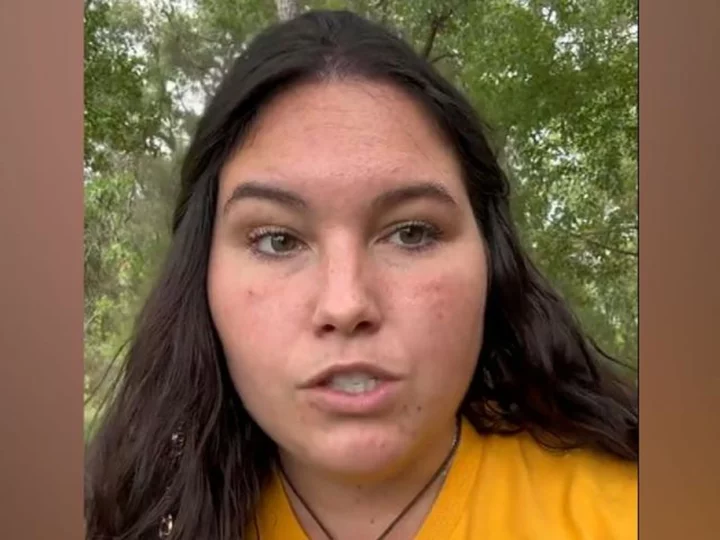
Florida teacher says she is under investigation after showing 5th grade class Disney movie with gay character
A fifth-grade teacher said she is being investigated by the Florida Department of Education after she showed her students "Strange World," a 2022 animated Disney movie featuring a character who is biracial and gay.
2023-05-15 22:49
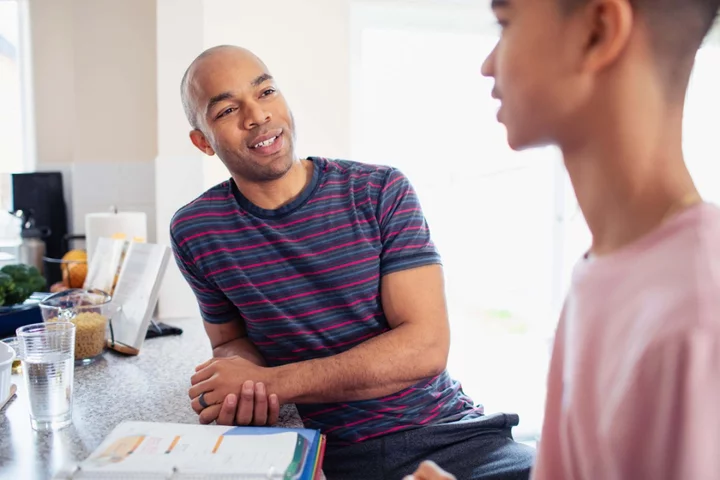
9 actually useful things you can do to support teens this exam season
Exam season is underway, and many teenagers might be feeling overwhelmed about the important tests they’re facing over the next few months. “Sitting exams is often one of the most overwhelming and high pressure experiences teens face, and students often put immense pressure on themselves,” says Lara McIvor, a revision expert at Save My Exams. “For parents with children taking exams, it can be difficult to know how best to support their child without being too involved or under-supportive. “As parents and teachers, it should be our mission to ensure students have access to clear support systems, coping mechanisms and study techniques over these challenging few months, and we should all be better educated in the warning signs of stress in teens.” And Matt Buttery, CEO of the Triple P Positive Parenting Programme, adds: “This can be a stressful time, but the good news is that parents can support young people and help remove some of the pressure around exam season. By setting a positive example and encouraging them, you can help ensure they remain happy and healthy, as well as reach their full academic potential.” So what can parents and carers do to actually make the whole exam experience better for teens? 1. Encourage them to chat with you Encourage open communication, and if your teen seems stressed, ask if they’d like to talk through revision together, or more broadly discuss their concerns, suggests Buttery. “It’s important your child knows you’re there for them if they need you,” he stresses. 2. Set up a quiet study area Ensuring your child has an optimum place to study without distractions is vital to their success, McIvor says. “Often concentration can wane, so making sure there are limited external distractions – such as loud music or TV – will allow for the best results and prepare them for their silent exams,” she says. 3. Don’t just rush to make them feel better It’s vital to acknowledge what teenagers are feeling, rather than just trying to make it go away, stresses psychologist Dr Audrey Tang. “One of the most important things anyone can do is validate their right to feel as they do,” she explains. “We’re not very good at sitting with anxiety and often rush to try and make it go away or to feel better, and this can lead us to quick fixes which can include unhealthy behaviour choices such as not bothering to try, often led by unhealthy thoughts like ‘If I don’t try, I can’t fail’.” 4. Help teenagers unpack their feelings Encourage teens to analyse or unpack how they’re feeling about their exams and revision, advises Tang. “If we take a moment to respect our feelings, and try to unpack exactly what we’re worrying about, we may be able to work out what we need to do next,” she explains. For example, is your teen’s anxiety caused by them not understanding some things, and if it is, which specific bits are causing the problem? Or is it linked to knowing their parents are stressed and not wanting to add to it, and if that’s the case, are other services available? “When we begin to unpack our feelings, rather than suppress or deny them, we have a better idea of what action is going to help us the most,” Tang explains. 5. Help with visual prompts Creating an ongoing learning environment throughout the exam period is key, says McIvor. She suggests sticking notes with key quotes, equations, etc on them around the house in places where your child can always see them. “This can be really useful for some students as it allows for constant exposure to materials,” she explains. 6. Avoid ‘toxic positivity’ If a teenager says things like, ‘I’m so stupid’, or ‘I’m rubbish at everything’, it’s natural for parents to tell them they’re brilliant, observes Tang. “Unfortunately, this has the effect of not validating those emotions, and the opportunity to understand what they’re trying to say is lost,” she explains. “A better way to navigate that discussion would be to acknowledge the feeling with something like ‘I’m really sorry you’re feeling that way’, and asking for more information.” 7. Be a good role model Role modelling healthy ways to manage your own anxiety is hugely important, stresses Tang. “Why would you expect a young adult to listen to you if you aren’t showing in your own practice that what you’re suggesting works?” she asks. And Buttery advises parents to lead by example by staying positive and calm when talking about exams. “Avoid using phrases such as, ‘You must be nervous’,” he says, “As you may risk accidentally making an otherwise calm child more stressed. Children learn a great deal about how to manage their behaviour and deal with difficult situations from their parents. By demonstrating calm and resilient behaviour, parents can have a positive influence on their children’s ability to cope with adversity.” 8. Try stressbusting techniques together Tang suggests practising self-care or stressbusting techniques together, such as affirmations with deep breathing. One technique, she says, is to get your child to note down everything they need to do and its relative importance on a pie chart, where the size of the slice shows the importance of the activity. Then ask them to draw on a scale of zero in the centre, to 10 on the outside, where they are in each segment. “This gives them a visual representation of what they need to do, and where they are, as well as an indication of the areas they’re neglecting, and how important those areas are,” she says. “By having everything on one pie chart, it might feel a lot more manageable.” 9. Maintain the family routine Ensuring family dinners and other rituals remain part of daily life can help teenagers cope with exam stress, as routine is predictable and reassuring at a time of pressure and uncertainty. Maintaining structure can also help your child plan their downtime, stresses Buttery, who adds: “It’s important to ensure they’re taking time to relax and unwind, whether by watching their favourite TV show, playing a game, or hanging out with friends.” Read More Charity boss speaks out over ‘traumatic’ encounter with royal aide Ukraine war’s heaviest fight rages in east - follow live Children In Need removes Pudsey’s bandana to show not all challenges are visible Is your child too anxious to go to school? What’s the link between the menopause and anxiety?
2023-05-15 22:15

How to check if you have skin cancer: Symptoms and signs to look out for
It is the most common form of cancer in Britain and kills around 2,100 people in the UK each year, but still a “shocking” number of people remain unaware of the dangers of skin cancer, its links to sunburn, and how to spot the signs of this deadly disease. An overwhelming 77 per cent of people would not recognise signs of a melanoma – a malignant skin cancer tumour – despite the majority of Britons worrying about skin cancer, a new study by the British Association of Dermatologists (BAD) has found. There are two types of skin cancer; melanoma, the deadliest form of which around 13,000 new cases are diagnosed each year in the UK, and non-melanoma, of which there are more than 100,000 new cases diagnosed every year. The risk of melanoma is doubled if a person has had five or more sunburns at any age, the Skin Care Foundation states, but adds that experiencing just one blistering sunburn in childhood or adolescence more than doubles a person’s chances of developing a melanoma later in life. Non-melanoma comes in two most common forms: basal cell carcinoma, which accounts for about 75 per cent of skin cancers, and squamous cell carcinoma, which accounts for about 20 per cent. It is mainly caused by overexposure to UV light. But despite the serious risks of cancer posed from sunburn, nearly three quarters of people surveyed by BAD admitted to having been burned in the past year alone, while 40 per cent of people were found to never check themselves for signs of cancer. Here is how to check for possible signs of melanoma and non-melanoma skin cancer: Melanoma: The NHS states the first signs of a melanoma is often a new mole, or the change in appearance of an existing mole. Moles are usually round or oval, with a smooth edge, which is not bigger than 6mm in diameter. Any change in size, shape, or colour, any bleeding, crustiness or itchiness, or how painful a mole is should be shown to a doctor. The NHS has an ABCDE checklist to help people tell the difference between a normal mole and a melanoma: Asymmetrical – melanomas have two very different halves and are an irregular shape. Border – melanomas have a notched or ragged border. Colours – melanomas will be a mix of two or more colours. Diameter – melanomas are larger than 6mm (1/4 inch) in diameter. Enlargement or elevation – a mole that changes size over time is more likely to be a melanoma. Non-melanoma: Non-melanoma usually appears as a lump or discoloured patch of skin that does not heal. If a person experiences on of these patches that do not heal after four weeks, they should see their GP. Signs of Basal cell carcinoma can look like a small red or pink lump, though it can also appear as a pearly-white or waxy-looking lump, or it can also appear as a red or scaly patch of skin. The lump, whether pink or white, will grow slowly and can become crusty or bleed, or become a painless ulcer. Signs of Squamous cell carcinoma are the appearance of a firm pink lump. This lump could have a flat, scaly or crusted surface, often bleeds easily and feels tender to touch and can also become a painless ulcer. Read More UK skin cancer statistics 'shocking' Skin cancer referrals up 41 per cent in 5 years Wolverine star Hugh Jackman treated for skin cancer Cheap holidays blamed for huge rise in skin cancers
2023-05-15 19:16
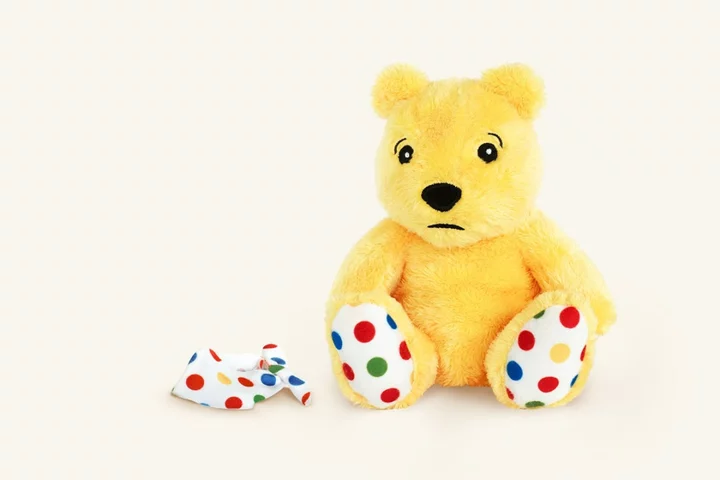
Children In Need removes Pudsey’s bandana to show not all challenges are visible
BBC Children In Need has launched a new Behind The Bandana campaign to mark Mental Health Awareness Week. The charity has temporarily removed mascot Pudsey’s eye covering to show “not all of the challenges that children and young people may be facing are visible”, the broadcaster said. The campaign encourages conversations between children and parents, carers and other trusted adults “to ensure no child faces their emotional and mental health challenges alone”. Former Love Island contestant Dr Alex George, who has campaigned for better mental health after the death of his 19-year-old brother Llyr by suicide in 2020, has been named Behind The Bandana ambassador. He said: “I know how important early intervention is in helping make a difference to the emotional wellbeing of children and young people and so I am very proud to be the ambassador of such a powerful campaign that really shines a light on the mental health crisis we are facing. “As highlighted by Pudsey bear himself, mental health issues can be less visible on the outside, but conversations and positive relationships really can help.” What’s also clear is that we can all play a role in addressing early signs of worry and anxiety by showing children and young people that we’re here to listen and to support them Simon Antrobus, Children In Need As part of the campaign, Children In Need has released the findings of a new Censuswide survey shedding light on how comfortable children feel when asking for help with their feelings and how often they feel the need to put on their “metaphorical bandana” and hide their emotions. While nine in 10 parents surveyed said they talk to their child about their mental health at least once a month, more than a quarter of young people surveyed said they had not talked to someone they trust about their mental health in the last six months. Children In Need’s boss Simon Antrobus said: “This research is a clear indication that our Behind The Bandana campaign is urgently needed. “What’s also clear is that we can all play a role in addressing early signs of worry and anxiety by showing children and young people that we’re here to listen and to support them. “By recognising and acknowledging that some feelings of worry and anxiety can be hidden means early conversations, sensitively delivered with kindness and empathy, can make a real difference to a child’s wellbeing and can help prevent mental health problems from becoming embedded.” Read More Charity boss speaks out over ‘traumatic’ encounter with royal aide Ukraine war’s heaviest fight rages in east - follow live
2023-05-15 17:21

Is your child too anxious to go to school?
Like adults, it’s normal for kids to have wobbles and worries. But what happens when anxiety becomes an ongoing problem, causing a lot of distress and impacting school attendance? “It is natural for children to not want to go to school from time to time. For example, they might be worried about a test, or a problem with a friend,” says Dr Julia Clements, principal educational psychologist for children’s mental health charity, Place2Be. “With a bit of support, most children will be able to attend school regularly and to not avoid it when things get a bit tricky. However, other children may become so anxious that they start to avoid school all together.” Spotting the signs Remember, children often aren’t able to tell adults when they’re struggling with anxiety. Parents and carers can look out for signs, though. “Anxiety can show up differently in different children. Your child may become tearful or quiet at bedtime, for example, or report feeling so ill they cannot attend school. Alternatively, your child may appear quite angry, argumentative and refuse to get ready for school,” says Clements. Dr Marianne Trent, clinical psychologist and author of The Grief Collective, who previously worked in child and adolescent mental health services (CAMHS), adds: “A child may complain about not wanting to go to school, or that it is boring or that they have tummy ache. They may drag their heels more about leaving the house or walking to school.” Responding with care Showing that you are interested and care about how they’re feeling can be really helpful. Having your support could help alleviate their worries, and hopefully you’ll be able to work through some strategies together. “It is important that parents and carers acknowledge the distress their child is experiencing, and that they are finding going to school a real challenge,” says Clements. “For example, you might say something like, ‘I can see that you are really worried about going to school and that going in will be really hard for you’. “However, it is also important to help your child to ‘face their fears’ and to attend school, despite it being the last thing they feel like doing! Acknowledge that this might be tough, but that you believe in them and will support them to do this difficult thing. Praise and encourage your child for any small steps of progress they are able to make towards attending school regularly.” Trent suggests talking to them about what might have caused their sudden reluctance to attend school: “Asking how they’re feeling and if anything happened the day before which made them feel worried, sad or confused can be a useful first step.” It might be easy for parents and carers to get frustrated and possibly angry if children refuse to go to school. However, this could lead to more distress, so it’s helpful to try and communicate calmly. Trent says: “It’s worth knowing that anger is a secondary emotion, and that this might mask a feeling of not having control, sadness, or even parental anxiety too. “Trying to enter into conversations when both parties are feeling well rested can give the best chance of staying calm. It’s also important that repairing any ruptured relationships is modelled ideally as soon as possible after any harsh or loud words have been spoken,” she adds. Talk to the school If the pattern continues, Trent says: “Arranging a meeting to discuss with the school can be an important step forward. If school attendance drops below a certain percentage, then it may trigger a referral to Child and Adolescent Mental Health services (CAMHS) and/or social care. “If there is a pastoral department in school, then arranging for the child to spend time there doing some 1:1 or group work can be useful. Similarly, liaising with mental health and support services for therapy or support can be transformational too.” Your GP can help advise on mental health support, and some schools may also have counselling services in place. However, Clements says there may be various ways school staff can potentially help – simple adjustments that could make a big difference: “For example, your child may like to be met at the gate, or being given a special job to do in the morning.” Is there anything else going on? It’s important to consider whether other factors could be coming into play, which may require additional attention and support. Clements says: “Do make sure that your child is safe from harm at school – for example, their avoidance of school is not due to them being bullied. If your child is avoiding school because of their neurodivergence or additional needs, then liaise with the SENCO (special educational needs co-ordinator) to make sure that reasonable adjustments are being made.” Read More Charity boss speaks out over ‘traumatic’ encounter with royal aide Ukraine war’s heaviest fight rages in east - follow live Could talking to toddlers be the key to early brain development? What’s the link between the menopause and anxiety? How to encourage green-fingered kids
2023-05-15 16:26
